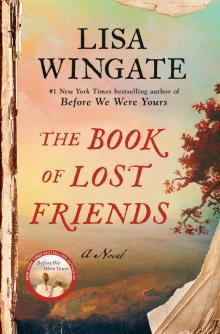- Home
- Lisa Wingate
Larkspur Cove
Larkspur Cove Read online
Larkspur Cove
LISA WINGATE
© 2011 by Wingate Media, LLC
Published by Bethany House Publishers
a division of Baker Publishing Group
P.O. Box 6287, Grand Rapids, MI 49516-6287.
E-book edition created 2010
All rights reserved. No part of this publication may be reproduced, stored in a retrieval system, or transmitted in any form or by any means—electronic, mechanical, photocopying, recording, or otherwise—without the prior written permission of the publisher. The only exception is brief quotations in printed reviews.
ISBN 978-1-4412-1418-8
Library of Congress Cataloging-In-Publication Data is on file at the Library of Congress, Washington, DC.
Unless otherwise identified, Scripture quotations are from the HOLY BIBLE, NEW INTERNATIONAL VERSION.® Copyright © 1973, 1978, 1984 by International Bible Society. Used by permission of Zondervan Publishing House. All rights reserved.
For Sydney and Ansley
And their awesome grandparents,
The Blues
Contents
Chapter 1
Chapter 2
Chapter 3
Chapter 4
Chapter 5
Chapter 6
Chapter 7
Chapter 8
Chapter 9
Chapter 10
Chapter 11
Chapter 12
Chapter 13
Chapter 14
Chapter 15
Chapter 16
Chapter 17
Chapter 18
Chapter 19
Chapter 20
Chapter 21
Chapter 22
Chapter 23
Chapter 24
Acknowledgments
Discussion Questions
About the Author
If you’re lucky enough to be at the lake,
you’re lucky enough.
– Welcome sign, Moses Lake
Chapter 1
Andrea Henderson
If you’re lucky enough to be at the lake, you’re lucky enough.
That motto is boldly emblazoned on signs at either end of the sleepy little shoreside burg of Moses Lake, Texas. The letters, carefully tinted with gold paint, shine in the sunlight like a heavenly promise.
Or a divine farce, depending on who you are.
If you’re on your way to an appointment you can’t afford to miss, and you find yourself lost on some back road, listening to the hiss of a tire going undeniably flat … well, then … proximity to water does not in any way alter your sense of misfortune. The only overriding feeling at a time like that, other than sheer terror, is an unhappy kinship with the road. A sense of being just like it – rutted, pitted, cracked, and scarred, wandering through the wilderness, headed in completely the wrong direction.
I’d always imagined, as I counted down the latter half of my thirties, that I’d be rolling through life like a family sedan on a superhighway – not in Moses Lake, certainly, but somewhere. It was a comfortable expectation. The problem is, however, that building a life is a little like planning a road trip. You travel mile by mile, each depending on the last. It’s hard to end up where you planned to be when there are flaws in the map, and the more you look, the more you realize there have been gaps all along, and at this point you’re hopelessly off course.
Now what? would be a logical question at such a time, but the problem with asking such questions – of God, or the universe, or whoever you believe might be listening – is that you already know the logical reply, and you’re just voicing the query because you don’t like your own answer. You want someone to tell you differently.
I pictured how I must have looked standing there on that middle-of-nowhere dirt road – an average brown-haired, brown-eyed woman in a new pantsuit and sensible shoes, shouting into the air, “Could this day possibly get any worse! Could this week, this year, this … anything possibly get any worse?”
Of course there were worse things than being stuck in the woods, thereby flubbing my first afternoon of field appointments. But considering my woeful lack of experience, I was fortunate to have gotten a counseling position at all, even if my duties did include driving the back roads to work with families who lived out in the sticks. It was a starting point, at least, and I couldn’t afford to lose this job. One way or another, I had to get myself back on the road.
My cell phone let out a wobbly, in-and-out ring, and somehow I knew it wasn’t one of the tow-truck drivers for whom I’d left messages with directions that included things like, Turn by the forked tree, and go past the stinky hog farm with the fence made of contraband road signs, and keep going, keep going, keep going until you ford what looks like a bottomless mudhole, and at the top of the next hill, you’ll see a blue car in the ditch on the right… .
No telling whether those directions would lead anyone to me, but I had no choice but to leave them and to leave a message at my office, where no one had answered either. My cell phone was slowly losing battery strength atop a pile of CPS case files and maps, while tow-truck drivers everywhere took coffee breaks away from their phones. Thanks to my son, who at fourteen should have had no use for a cell phone car charger, I had no means of recharging my phone at the moment.
I could see the plan for the day rapidly disintegrating from Attack first day of field work with passion, vigor, and determination, to the old tried-and-true motto of the past year, Get by somehow, along with Figure out how to change tire (I’d seen this done on TV a time or two) or possibly Hike to safety.
Taking a hopeful breath, I tried to sound calm as I answered the phone, so as not to scare away whoever was on the other end.
My mother’s static-laced voice sent a strange mixture of relief and queasy dread through me. Mom and Dad hadn’t wanted me to take the counseling position, and this snafu in the woods would only help to prove their point. On the other hand, I was as good as rescued, and even having a parent lecture you at thirty-eight is better than being stranded in the middle of nowhere. “Mom? Mom, can you hear me? I need help.”
She didn’t answer. For a moment, I had the disheartening vision of my voice being lost between cell phone towers somewhere. Maybe I could hear my mother, but she couldn’t hear me. Which also meant that all those calls to tow-truck drivers were a waste of what was left of the cell phone batteries. “Mom? I need help.”
Mother was probably tired of those words, after a year in which so many of our interactions centered on my need for help. I couldn’t blame her. I was tired of it. I was tired of myself, tired of not being self-sufficient, tired of this weird dynamic in which, after sixteen years of marriage, I was suddenly on my own again – destitute and back under my parents’ thumb, living in their lake house. Hence, the job with Tazinski and Associates, which was at the low-paying end of the counseling spectrum but still a realistic means of rebuilding my life and supporting myself and my son. It was time to stop hanging on everyone else’s apron strings, use the counseling degree I’d earned while my ex-husband was the vice-chancellor of a lovely Christian college in Houston, and make a life of my own.
“Andrea. Andrea?” Mother’s voice crackled amid the static of a choppy connection. “Where … you? I … barely hear.”
“Mom, you’re not going to believe this, but I’ve got a flat. I need a wrecker. I’m out in the middle of no …”
“Andrea? I can’t … ake out one thing you’re saying. Pull to the top of a … and stop driving… . told you you’d have terrible reception out on the other side of the lake. What if your car breaks down, or you get … tuck in the mud? What then? It isn’t safe … all kinds of riffraff live up there in the timber, and who knows … sort of people might be hanging around the public beaches. H
onestly … drea! Most of those roads are so deserted, you could sit …”
“Wrrr-eck-er. I. Need. A . Wrrr-eck-er. Mom? Hello?” The line went dead, and when I tried to dial back, the phone just clicked, and clicked, and clicked, pinging towers in vain.
Thus, I had the answer to the hasty question I’d spit into the air moments before. What could be worse than having a flat tire in the middle of nowhere when you’re supposed to be at an appointment?
Finding out that your cell calls aren’t going through, and no wrecker is coming, and you really are all alone … and perhaps hearing the rumble of thunder somewhere in the distance on what had seemed to be a perfectly clear July afternoon.
“No, no, no,” I whispered, or perhaps by then I was begging. If a storm hit, the dirt road I was standing on would rapidly become a quagmire of chalky limestone-colored goo.
Shading my eyes, I looked up, but the narrow strip of sky visible above the thick canopy of live oaks seemed harmless enough. Just the gentle blue of central Texas summer. Not a cloud in sight.
The rumble grew, then waned, then grew again. A puff of breeze blew through, whipping a silty, white dust devil along the road. I turned my shoulder and squeezed my eyes shut, the force of the wind pushing dust through my clothing and into the pores of my skin. When the breeze died, the scent of dirt road and imminent storm remained, along with a faint noise I couldn’t quite identify. Grit fell from my lashes as I blinked, straining toward the sound. A rumbling, but not the rise and fall of thunder.
A car. I heard a car.
Rescue! Oh, thank you! I moved closer to the road, but a hallelujah yell died on my lips as an old pickup, gray with spots of rust and a missing front fender, rattled into view amid the dust cloud. Squinting, I tried to make out the driver, but reflections on the dirty glass obscured the inside. The shadow of a pine tree, thick and murky, finally passed over the vehicle, yielding a fractional glimpse into the cab. The driver was tall, thin-shouldered, wearing a ball cap of some kind. He wasn’t alone in the truck. Someone was in the passenger seat, the head rising just slightly above the dash. A child, perhaps. The idea was comforting, as if somehow the presence of a child indicated that I, too, would be safe.
On the other hand, my new career was all about the knowledge that children weren’t always safe. I’d headed up here for a home visit with a woman who’d been reported to CPS by a summer-school bus driver who couldn’t drop off the kids because a domestic dispute was ongoing in their front yard. Growing up, I’d heard the plethora of warnings about the riffraff living on the other side of the lake. There was no telling what kind of people resided in these hills, where patches of private land remained remote, surrounded by sprawling state park holdings and massive blocks of territory that had been timber tracts in days gone by.
Stepping back against my car, I held out an uncertain, one-handed stop sign, mentally weighing my options. I needed help, but I knew I was in a very vulnerable position… .
The truck drifted to the left, as if to go around me and pass by. Surely no one would simply drive on and leave a woman stranded alone on this remote road.
I moved forward a step, stuck my hand out farther.
Surely he’d stop.
“Hey!” I hollered. The truck was only a few feet away now, close enough that I could see a hand gripping the partially opened passenger window. A small hand. A child’s hand, the fingers brown with dirt. “I need help!” I hollered above the engine’s wheeze and chug. Something was squealing at an ear-piercing pitch, the sound bouncing off trees and cliffs. “I need help!”
As if in answer, a sudden gust of wind swirled up, caught the dust cloud rising behind the truck, whipped it in my direction. I threw my arm over my eyes, felt grains of sand and tiny bits of gravel pepper my cheeks.
Thunder rumbled somewhere nearby.
A dog barked and growled, the sound so close that I felt for the edge of my car, grabbed it and pulled myself back, prepared to climb in, if necessary. Squeezing my eyes open a pinch, I saw the dog, a pit bull with its ears flattened and teeth bared, poised to jump as the truck slowly circumvented my car. I watched in frozen fascination, the way voyeurs look into the eye of a tornado or ogle a traffic accident.
The truck cleared my vehicle, and behind the dog’s frenetic barking, a tiny slice of movement snagged my attention. A little girl was watching me through the back window. She’d turned in her seat, climbed onto her knees, pressed a palm to the glass, her head tilted slightly to the side, as if she were curious about me, or confused by my presence on the road. Her dark hair floated in wispy, tangled curls around her face, her pale blue eyes regarding me with a concern that seemed out of place in the round orb of a child’s face. She couldn’t have been more than five, maybe six. Leaves were tangled in her hair, and her skin was brown from the sun, her cheeks a combination of pink sunburn and smudges of dirt.
She wasn’t wearing a seatbelt. The mother in me protested, and the newly certified counselor made a mental note. It wasn’t uncommon for people to skip the seatbelt while tooling around the lake on these back roads, but it wasn’t legal, either.
The truck drifted to the shoulder ahead, the brakes squealing as it slowed. I caught a breath, relieved, and in the back of my mind, I turned over the seatbelt issue – looked at it from a few different angles. Was there a polite way to tell your rescuer that he needed to buckle up his little passenger? Judging by the stooped shoulders and shaggy strings of gray hair dripping from the edges of the ball cap, he was probably a grandfather who didn’t know any better. Perhaps still living back-in-the-day when kids cavorted around car interiors unburdened by seatbelts, and the only safety restraint was a grownup’s hand shooting out at a sudden stop.
The truck rattled to a halt thirty feet past my car. I waited for it to shift into reverse and come back, but it only sat idling. The driver moved just enough to look in his rearview mirror as the dog ran to the tailgate to bark. The little girl continued eyeing me through the back window.
Walking to the center of the road, I motioned to my car. “Hey … hello? I have a flat tire. I …” In my head, a caution flag went up. This was not normal behavior. He was just watching me in the mirror. Something was wrong.
Overhead, a cloud blotted out the sun, and the wind caught the flat of my back, shoving like an invisible hand. Somewhere in the hills, thunder rumbled again, raising goose bumps on my arms and making me acutely aware of my desperate circumstances.
The dog clawed the tailgate, snarling and baring its teeth, its small, slanted eyes narrowing as if it were priming for attack. Inside the truck, the little girl turned her attention to the animal.
A child wasn’t safe around a dog like that. That was the kind of dog that ended up on the news for mauling someone to death. What sort of a person kept a dog like that around a child?
I took a step backward, looking again at the driver. What was he doing? Why was he just watching me? Why would he stop but not get out?
Was he studying me, trying to decide if I would put up much of a fight?
If you take your boat to the shallow waters,
you’d better know where the stumps are.
– Anonymous
(Written on the wall of wisdom,
Waterbird Bait and Grocery)
Chapter 2
Mart McClendon
There was a summer storm popping up in the hills across the water – just a little thing, but if it kept coming this way, it’d drive the tourists off the water and put a damper on the day. One thing I’d learned in my short time here was that you couldn’t predict the weather, or pretty much anything else. On Moses Lake, it was just about as likely the unexpected would show up as the expected. For folks who liked to plan, make schedules, and keep some form of electronic device strapped to the hip, Moses Lake was just a spot to pass by on a Sunday drive, maybe pull off at the scenic overlook above Eagle Eye Bridge and watch the weekenders tear up the water with their ski boats and pontoon rigs.
Those up fo
r some adventure might cut off the highway near the dam, pick up a sandwich at the Waterbird Bait and Grocery, or rattle down through the trees and rent a cabin or book a canoe trip. Could be that half-day canoe trip or lakeside vacation wouldn’t end up to be any more than a quiet, relaxing time-out from whatever they left behind. If they were lucky.
Moses Lake had a way of taking on a life of its own. You could ask twenty full-timers why that was, and you’d get twenty different answers – everything from Native American legends to ghost stories about the strange voice of the Wailing Woman coming off the cliffs at Eagle Eye. Some would say the lake was haunted by restless spirits from the farms and towns that were buried under twenty-five thousand acres of water when the Corps of Engineers seized the land in the fifties and built the dam. Others claimed it was the name – Moses Lake. Moses wandered in the wilderness for forty years before he found a resting-place, and even then he couldn’t go in.
If I had to give an opinion, I’d say it’s the water. There’s something about water that attracts all sorts of folks and brings out impulses they didn’t know they had.
There was never any telling, on any given day, who’d show up in Moses Lake and what would happen. After just under six months as game warden in the southern part of the county, I’d figured out that life in Moses Lake was as random as the weather. That must’ve been why, twenty-odd years ago, my folks didn’t stay in the area any longer than they had to. Soon as my dad finished working construction on the hydroelectric plant, they’d loaded us four boys and beat it out of town. We’d ended up in southwest Texas, where you could figure on the weather, and the folks, and the rhythm of things. It was quiet down there in the Big Bend country – friendly, peaceful, and scenic, if you liked a long view and a big sky.

 Before We Were Yours
Before We Were Yours A Sandy’s Seashell Shop Christmas
A Sandy’s Seashell Shop Christmas The Book of Lost Friends
The Book of Lost Friends Larkspur Cove
Larkspur Cove The Sea Glass Sisters
The Sea Glass Sisters The Language of Sycamores
The Language of Sycamores Dandelion Summer
Dandelion Summer Word Gets Around
Word Gets Around Beyond Summer
Beyond Summer Firefly Island
Firefly Island The Tidewater Sisters: Postlude to The Prayer Box
The Tidewater Sisters: Postlude to The Prayer Box Talk of the Town
Talk of the Town![Blue Sky Hill [01] A Month of Summer Read online](http://i1.bookreadfree.com/i1/03/29/blue_sky_hill_01_a_month_of_summer_preview.jpg) Blue Sky Hill [01] A Month of Summer
Blue Sky Hill [01] A Month of Summer A Thousand Voices
A Thousand Voices Over the Moon at the Big Lizard Diner
Over the Moon at the Big Lizard Diner Never Say Never
Never Say Never Good Hope Road
Good Hope Road The Summer Kitchen
The Summer Kitchen A Month of Summer
A Month of Summer Blue Moon Bay
Blue Moon Bay Drenched in Light
Drenched in Light The Sea Keeper's Daughters
The Sea Keeper's Daughters